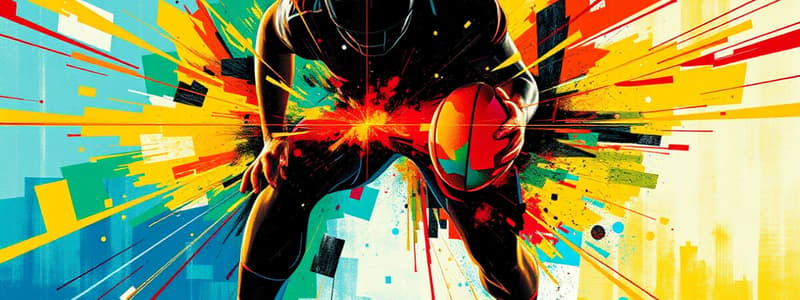Podcast
Questions and Answers
What is Sports Vision concerned with?
What is Sports Vision concerned with?
- Nutrition for athletes
- Evaluating and enhancing visual performance (correct)
- Strength training for athletes
- Team strategy and tactics
Vision is the process of seeing and perceiving the surrounding environment by using information contained in __________.
Vision is the process of seeing and perceiving the surrounding environment by using information contained in __________.
light
How many visual skills are identified in Sports Vision?
How many visual skills are identified in Sports Vision?
9
Sports Vision procedures are only applicable to elite athletes.
Sports Vision procedures are only applicable to elite athletes.
Which of the following is NOT listed as a visual skill in Sports Vision?
Which of the following is NOT listed as a visual skill in Sports Vision?
Match the following visual skills with their descriptions:
Match the following visual skills with their descriptions:
What is the primary purpose of Sports Vision training?
What is the primary purpose of Sports Vision training?
Flashcards are hidden until you start studying
Study Notes
Sports Vision Overview
- Sports vision focuses on enhancing athletes' visual performance and skills through various procedures.
- Essential visual skills include depth perception, binocular vision, eye-hand coordination, and visual acuity.
Key Visual Skills
- Depth Perception: Crucial for judging distances and spatial relations in sports.
- Binocular Vision: Ability to use both eyes effectively for clearer and more accurate vision.
- Eye-Hand Coordination: Important for precision and timing in sports actions.
- Eye Tracking: Helps athletes follow moving objects and react accordingly.
- Peripheral Vision: Awareness of surroundings outside of direct line of sight.
- Color Perception: Ability to detect and interpret colors, which can influence game strategies.
- Visual Integration: Combining visual information with physical movement.
- Visual Acuity: Sharpness of vision, essential for clear sight during competition.
Importance of Vision in Sports
- Appropriate visual information aids athletes in monitoring their environment while performing tasks.
- Effective vision enables quick response to dynamic situations, such as tracking balls or opponents.
- Visual training can enhance performance by refining how athletes gather and process information.
Course Components
- Course includes case history taking, visual examinations, clinical assessments, and diagnostics tailored for athletes.
- Focus on evaluating and improving visual performance through the use of appropriate visual aids when needed.
Topics for Further Research
- Eye injuries affecting athletes and their prevention strategies.
- Sports correction methods such as:
- Eyeglasses (e.g., goggles, lenses, tints)
- Contact lenses
- Surgical options
- Examination of various visual skills unique to athletic performance.
- Development and use of eye protectors during competitive sports.
Vision Characteristics for Athletes
- Elite athletes may benefit from superior vision, highlighting the importance of vision training.
- Vision begins with the eye, where light is processed for perception and action refinement during physical activity.
Studying That Suits You
Use AI to generate personalized quizzes and flashcards to suit your learning preferences.




